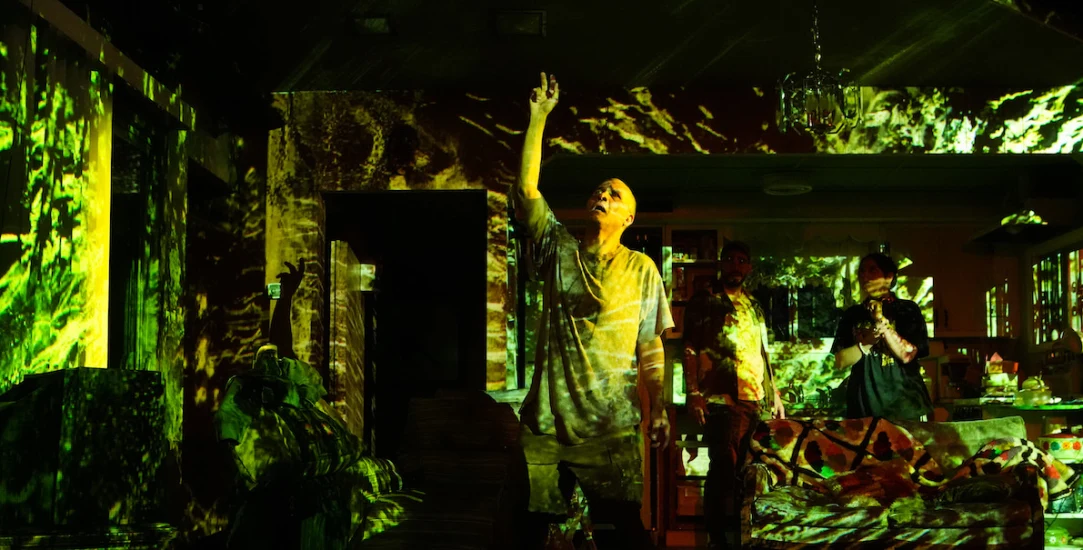'Wet Brain' review – an otherworldly look at generational trauma
Read our four-star review of John J. Caswell, Jr.'s Wet Brain, a genre-bending play co-produced by Playwrights Horizons and MCC Theater, on through June 25.
John J. Caswell, Jr.’s Wet Brain is a kitchen sink drama with a running faucet. The play grapples with addiction and loss, and it builds and builds like water pressure. Set in Arizona, three wayward siblings converge in the family home to care for their ailing, alcoholic father. There is a steady stream of troubles for the family, all afflicted by addiction, and the leak cannot be fixed. Or, perhaps, no one is up for the challenge.
Wet Brain, co-produced by Playwrights Horizons and MCC Theater, offers a gripping, grating look at alcoholism and its effects on loved ones. The family patriarch, Joe (played with precision by Julio Monge), suffers from “wet brain,” a cognitive impairment caused by alcohol abuse. Joe is non-verbal, staggers across the stage, and experiences a distorted reality — he is often in another world, one possibly inhabited with extraterrestrials.
His daughter Angelina (Ceci Fernández) takes up the mantle of caring for him, but as an overworked nursing student, she enlists her brothers to help monitor their father. Joe is so far gone that his adult kids keep water bottles filled with vodka around the unkempt house to keep him at status quo and take turns keeping watch so he does not inflict self-harm. This environment is triggering for Ricky (Arturo Luís Soria), the estranged brother who left home to earn an M.B.A. and returns after six years.
The eldest brother, Ron (Frankie J. Alvarez), is perhaps the most affected by his father’s looming loss. His attempt to comfort his dad is to come over every morning and help him get ready for the day, pretending the pair will head off to work at the family’s auto mechanic garage. Joe, of course, is unable to work and stays home, hobbling around the house and drinking.
The play is supremely depressing, but there are moments of lightness, humor, and wonder that surprise. The comedy comes from the trio of siblings who probe wounds, poke fun, and recall childhood memories, all with humor, in the way only close siblings can do.
The three characters also hold a mirror up to one another, reflecting their myriad issues of alcohol and drug abuse, disordered eating, and mental illness. Ron tries to hide his dependence on alcohol by storing six packs in the toilet tank — his siblings are not so easily duped. These are all blows of a traumatic childhood. Besides their father’s illness, their mother died of suicide on Christmas Eve when the kids were young. There’s an unshakable, painful bond between the siblings, and the actors excavate the love beneath the surface through their tender performances.
Director Dustin Wills deftly navigates the genre-bending play as it moves between comedy, tragedy, and horror. Yes, horror. Through its immersive design, audiences are stuck in the family's discomfort, watching on like looky-loos peeping at a highway crash.
The set (by scenic designer Kate Noll) features a disheveled house with a large tree emerging from behind the roof, a sign of life outside the walls. The house, with its rocky foundation, spins from side to side between scenic transitions as eerie music (by co-sound designers Tei Blow and John Gasper) and flashing lights (by Cha See) transport the audience somewhere else entirely, perhaps inside Joe’s hallucinatory brain.
In the play’s most inventive, moving scene, the family ventures to a liminal plane that might be outer space. Projections (by Nick Hussong) of stars and planets whiz by as the family hangs on to an upside-down family room. They engage in painful, emotional conversations about the family’s trauma, and in this arena, Joe speaks fluidly and confidently. The scene evokes childlike wonder.
The play lacks a clear takeaway; rather, it offers up an examination of love and loss. Audiences go on a wild, wandering journey that casts addiction in a raw light. In Caswell Jr.’s play, the characters do not project judgment or disdain on their father or one another for their issues. They probe the truth of how mental illness and addiction trickled into their generation, and, by the end, they look for a way to fix the leaky faucet.
Wet Brain is at Playwrights Horizons through June 25. Get Wet Brain tickets now.
Photo credit: Julio Monge in Wet Brain at Playwrights Horizons. (Photo by Joan Marcus)
Originally published on
